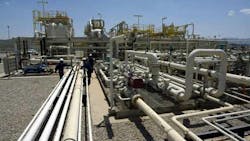Shell May Fall Short on Nigerian Export Targets After Pipeline Shutdown
LAGOS, Nigeria – Shell (IW 1000/1) warned today it may not meet production targets for crude exports in Nigeria after it shut down a major pipeline repeatedly hit by sabotage and theft.
"Force majeure has been declared on Bonny Light exports due to production deferment from leaks observed on the Trans Niger Pipeline" in Nigeria's Ogoniland region, the Nigerian subsidiary of the Anglo-Dutch oil giant (SPDC) said in a statement.
Force majeure is a legal term releasing a company from contractual obligations due to circumstances beyond its control. Bonny Light is one of the main grades of crude produced in Nigeria.
"SPDC and members of the community discovered that the spill at B-Dere was caused by unknown persons who drilled holes on the line," it said.
The Trans Niger Pipeline was shut down on Wednesday owing to leaks, reducing crude production by 150,000 barrels per day.
The pipeline had been repaired just two weeks earlier after what Shell described as a separate incident of sabotage.
Pipeline Damaged Repeatedly
Shell said the pipeline has been closed down in similar circumstances at least five times since early July.
"We're dealing with a social tragedy, an environmental crisis and a sad waste of resources," SPDC boss Mutiu Sunmonu said. "We find it difficult to safely operate our pipelines without having to shut them frequently to prevent leaks from illegal connections impacting the environment."
Shell and other oil majors operating in the Niger Delta have repeatedly decried the scourge of oil theft and infrastructure sabotage, which has been estimated to cost Nigeria at least $6 billion per year in lost revenue.
In August, Shell partly blamed such criminality in the Niger Delta for the company's "disappointing" second-quarter global profits.
Nigeria is Africa's biggest oil producer, exporting around 2 million barrels per day.
A 2009 amnesty deal with oil rebels led to a sharp decline in unrest, but criminal activity has since flourished.
While Shell blames most of the spills on sabotage, activists argue that the company does not do enough to prevent such incidents or effectively clean up the damage when they do occur.
Because of massive corruption, Nigerians have largely not benefitted from the country's oil wealth and some in the delta have justified crude theft as a means to funnel resources to the community.
Copyright Agence France-Presse, 2013
About the Author
Agence France-Presse
Copyright Agence France-Presse, 2002-2025. AFP text, photos, graphics and logos shall not be reproduced, published, broadcast, rewritten for broadcast or publication or redistributed directly or indirectly in any medium. AFP shall not be held liable for any delays, inaccuracies, errors or omissions in any AFP content, or for any actions taken in consequence.
